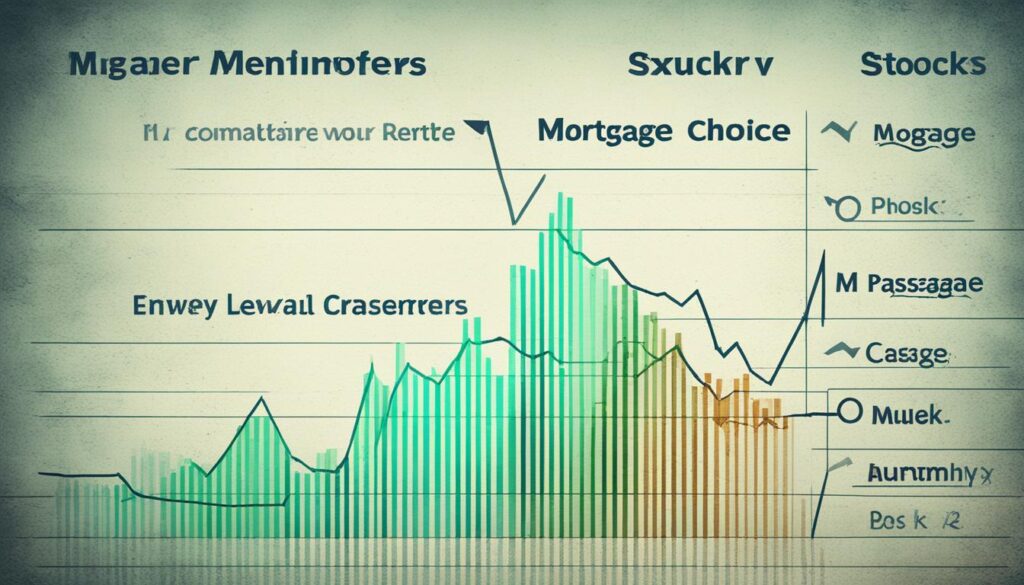Did you know that the average historical returns of the S&P 500 Index have ranged from 10% to 11% annually between 1926 to 20181? This statistic highlights a fundamental dilemma many homeowners face: should I pay off my mortgage early or invest in stocks? The decision may not only impact your financial landscape but can also influence your peace of mind, long-term wealth, and financial obligations. While some may prioritize the emotional benefit of being debt-free, others see opportunities for growth through stock investments. Such considerations form the crux of mortgage payoff vs investing discussions, as we navigate through the potential returns, risks, and implications of each financial strategy. In the following sections, we will dive deeper into understanding the financial implications and performance metrics required for informed decision-making2
Key Takeaways
- The average returns of the S&P 500 can make investing appealing compared to mortgage payoff.
- A mortgage payoff can bring peace of mind but might mean missing out on investment growth.
- Calculating the opportunity costs is critical in deciding between paying off a mortgage or investing.
- A clear understanding of one’s financial situation and risk tolerance is essential.
- Financial decision-making involves weighing emotional factors against financial outcomes.
Understanding Mortgage Payoff vs. Investing
The choice between paying off a mortgage and investing in stocks presents significant financial implications. Evaluating these options requires a thorough mortgage prepayment analysis, especially as individual circumstances and market conditions vary. Understanding the benefits and risks associated with each choice allows homeowners to make informed decisions regarding their finances.
The Financial Implications of Paying Off a Mortgage
Paying off a mortgage early can lead to substantial savings in interest payments. For homeowners, this can amount to thousands of dollars over the life of the loan. Eliminating monthly mortgage payments provides the freedom to redirect that cash towards other financial goals, potentially freeing up $1,000 or more every month for additional investments or savings3. Nevertheless, individuals should consider the trade-offs involved, such as the loss of valuable tax deductions associated with mortgage interest. Additionally, there could be prepayment penalties imposed by lenders, which may deter early repayment3.
The Historical Performance of Stock Investments
Investing in stocks, particularly in volatile markets, has historically provided higher returns compared to paying off a mortgage. For example, data indicates that during a 43-year span starting in 1971, paying down mortgages outperformed investing in the S&P 500 sixty percent of the time4. However, between 1997 and 2007, this strategy proved beneficial 10 out of 11 years, even amid economic turmoil4. It is essential to recognize that while stock investments can yield higher potential returns, they also carry inherent risks, which can be mitigated through investment portfolio diversification mortgage payoff strategies. Stocks, when held long-term, may face capital gains taxes, whereas fixed-rate mortgages can offer a lower, tax-affected return compared to the stock market over certain periods4.

Key Considerations in Financial Decision Making
When navigating the complexities of financial decision making between mortgage payoff and stock investment, several key factors demand thorough analysis. Understanding your financial situation is essential, as it encompasses existing debts, savings, and long-term financial goals. An evaluation of risk tolerance is equally crucial, given that stock investments can be subjected to significant market fluctuations, while mortgage obligations often represent a more stable financial commitment.
Assessing Your Financial Situation
Individuals should first assess their overall financial health, noting factors such as liquidity and current debts. For example, it is common practice for professionals, including physicians, to analyze whether paying off a mortgage early is more beneficial than investing in high-return assets. Certain mortgage holders have found that those with interest rates below 4% tend to favor investing, expecting market returns to exceed the cost of mortgage interest5. Alternatively, those with higher mortgage rates, especially in the 7%-9% range, may discover advantages in prioritizing mortgage payments due to reduced financial risk5. The state of the economy will influence these factors; higher cash yields from safe investments, which are sometimes ephemeral, can shift the strategy from mortgage paydown to investment6.
Understanding Your Risk Tolerance
Determining your risk tolerance involves a personal reflection of comfort levels with market volatility and unanticipated changes. While the potential for higher long-term returns from stocks appeals to many, concerns about economic stability and mortgage interest rates can lead to alternative strategies. As inflation spikes and the Federal Reserve’s monetary policy impacts financial decision making, many find themselves weighing their mortgage equity optimization investment strategy against immediate financial goals. Those who prefer a more stable financial approach may lean towards eliminating debt first7. The peace of mind offered by a debt-free status often serves as a valuable consideration in decision-making6.

Should I Pay Off My Mortgage Early or Invest in Stocks?
As homeowners consider the critical decision of whether to accelerate mortgage payments or invest in stocks, it’s vital to analyze the potential returns on investments against mortgage interest costs. Understanding the financial decision making mortgage vs stocks can help tailor a strategy that maximizes financial growth. Investing in the stock market often presents the potential for higher returns compared to the savings from paying off a mortgage early.
Analyzing Return on Investments vs. Mortgage Interest
In mid-2023, eight in 10 homeowners had mortgage interest rates under 5%, with one fourth of that group holding rates below 3%8. This scenario creates a compelling case for exploring alternative investments, through which homeowners may generate higher returns. The average rate for a new 30-year mortgage is close to 7%, indicating that funds may be more effectively allocated toward investment opportunities that can outpace this interest rate8.
Investment firms are forecasting a 10-year return for bonds in the range of 5% to 6%8. Considering this return, the appeal of investing rather than aggressively paying off a mortgage becomes more discernible. Tax incentives associated with investing can further enhance the overall effectiveness of financial growth strategies, making a strong argument for maintaining liquidity through investments8.
The Opportunity Cost of Mortgage Payoff
The opportunity cost of allocating capital towards mortgage payments instead of investments is significant. Access to cash through assets like stocks and bonds is generally easier compared to home equity9. While paying off a mortgage early may save thousands in interest, particularly in the initial years, homeowners should consider the financial implications of tying up liquid assets into their home9.
| Aspect | Pay Off Mortgage Early | Invest in Stocks |
|---|---|---|
| Potential Returns | Interest savings may be low due to current rates | Higher historical returns, average of 10% or more |
| Liquidity | Reduced liquidity; home equity is less accessible | High liquidity; easier access to cash |
| Tax Implications | Limited tax benefits if mortgage is paid off early | Possible tax incentives can boost returns |
| Risk Factors | Less risk associated with eliminating debt | Market risks can fluctuate; returns are not guaranteed |
Furthermore, making additional payments or lump-sum contributions can significantly reduce interest and shorten the loan term9. The analysis of different financial paths necessitates careful consideration, especially in light of prepayment penalties that lenders may impose8. Effective financial decision making requires an understanding of both immediate benefits and long-term impacts.
Pros and Cons of Paying Off Your Mortgage Early
Deciding whether to pay off your mortgage early involves weighing significant advantages against potential drawbacks. One of the primary benefits of paying off mortgage early is the substantial interest savings that can accumulate over time. For instance, extra payments can lead to saving up to $241,000 in interest on a $400,000 mortgage at a 6% interest rate if paid off within ten years10. Eliminating this debt frees up cash flow, offering peace of mind and enhanced financial stability, as homeowners no longer have monthly mortgage obligations to meet.
However, there are also notable downsides of tying up cash in your home. By committing extra funds to mortgage payments, homeowners risk losing liquidity since that cash is essentially locked in home equity. In emergencies or urgent investment opportunities, accessing this equity typically requires refinancing or selling the home, which may not be practical or timely11. Furthermore, the average mortgage payment of $2,883 highlights the potential benefits of maintaining cash flow that could be reinvested elsewhere, particularly when considering investment returns could exceed mortgage interest rates over time10.
Ultimately, whether to pay off a mortgage early or invest heavily depends on individual circumstances and financial goals. It is advisable to conduct a thorough assessment to determine which strategy aligns most effectively with one’s long-term financial objectives, particularly when deciding between the benefits of paying off mortgage early and the opportunity cost of holding cash in real estate.
FAQ
Should I pay off my mortgage early or invest in stocks?
What are the financial implications of paying off a mortgage?
How does stock investment performance compare historically?
What factors should I consider in financial decision-making?
How can I analyze returns on investments versus mortgage interest costs?
What are the benefits of paying off a mortgage early?
What are the downsides of tying up cash in home equity?
Source Links
- https://www.forbes.com/advisor/mortgages/pay-off-mortgage-early-vs-investing/
- https://www.investopedia.com/ask/answers/05/052205.asp
- https://www.rocketmortgage.com/learn/pay-off-mortgage-or-invest
- https://www.moneygeek.com/mortgage/pay-off-your-mortgage-or-invest/
- https://www.physiciansidegigs.com/pay-off-mortgage-or-invest
- https://www.morningstar.co.uk/uk/news/247466/should-i-pay-off-my-mortgage-early-or-invest-my-savings.aspx
- https://knowledge.wharton.upenn.edu/article/should-i-pay-off-my-mortgage-early-in-this-economy/
- https://www.morningstar.com/personal-finance/pay-down-mortgage-or-invest-2024-edition
- https://www.ameriprise.com/financial-goals-priorities/personal-finance/should-you-pay-off-your-mortgage
- https://www.businessinsider.com/personal-finance/mortgages/paying-off-mortgage-early-pros-cons
- https://www.usatoday.com/money/blueprint/mortgages/should-you-pay-off-mortgage-or-invest/

